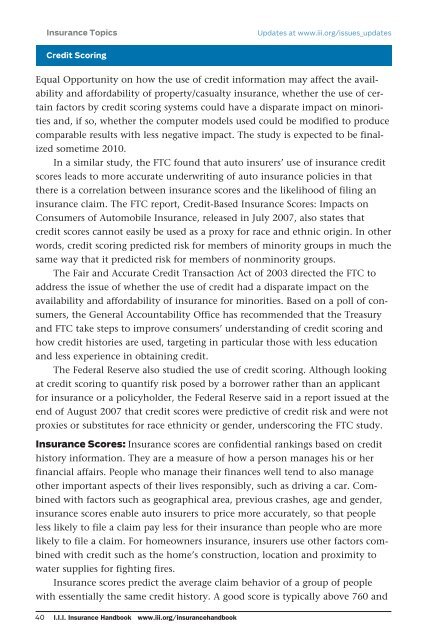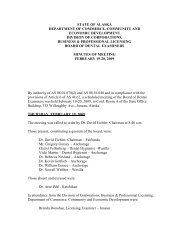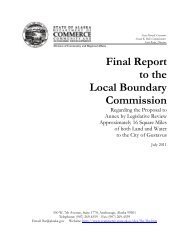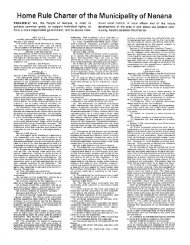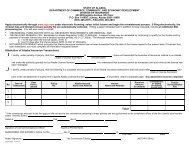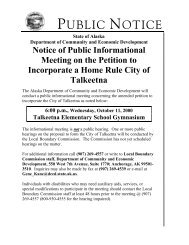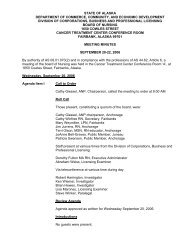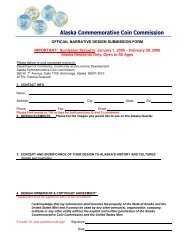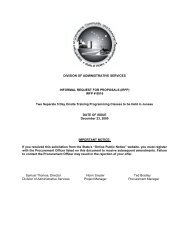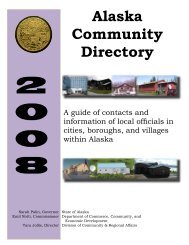Insurance Handbook - Alaska Department of Community and ...
Insurance Handbook - Alaska Department of Community and ...
Insurance Handbook - Alaska Department of Community and ...
You also want an ePaper? Increase the reach of your titles
YUMPU automatically turns print PDFs into web optimized ePapers that Google loves.
<strong>Insurance</strong> Topics Updates at www.iii.org/issues_updates<br />
Credit Auto <strong>Insurance</strong> Scoring<br />
Equal Opportunity on how the use <strong>of</strong> credit information may affect the availability<br />
<strong>and</strong> affordability <strong>of</strong> property/casualty insurance, whether the use <strong>of</strong> certain<br />
factors by credit scoring systems could have a disparate impact on minorities<br />
<strong>and</strong>, if so, whether the computer models used could be modified to produce<br />
comparable results with less negative impact. The study is expected to be finalized<br />
sometime 2010.<br />
In a similar study, the FTC found that auto insurers’ use <strong>of</strong> insurance credit<br />
scores leads to more accurate underwriting <strong>of</strong> auto insurance policies in that<br />
there is a correlation between insurance scores <strong>and</strong> the likelihood <strong>of</strong> filing an<br />
insurance claim. The FTC report, Credit-Based <strong>Insurance</strong> Scores: Impacts on<br />
Consumers <strong>of</strong> Automobile <strong>Insurance</strong>, released in July 2007, also states that<br />
credit scores cannot easily be used as a proxy for race <strong>and</strong> ethnic origin. In other<br />
words, credit scoring predicted risk for members <strong>of</strong> minority groups in much the<br />
same way that it predicted risk for members <strong>of</strong> nonminority groups.<br />
The Fair <strong>and</strong> Accurate Credit Transaction Act <strong>of</strong> 2003 directed the FTC to<br />
address the issue <strong>of</strong> whether the use <strong>of</strong> credit had a disparate impact on the<br />
availability <strong>and</strong> affordability <strong>of</strong> insurance for minorities. Based on a poll <strong>of</strong> consumers,<br />
the General Accountability Office has recommended that the Treasury<br />
<strong>and</strong> FTC take steps to improve consumers’ underst<strong>and</strong>ing <strong>of</strong> credit scoring <strong>and</strong><br />
how credit histories are used, targeting in particular those with less education<br />
<strong>and</strong> less experience in obtaining credit.<br />
The Federal Reserve also studied the use <strong>of</strong> credit scoring. Although looking<br />
at credit scoring to quantify risk posed by a borrower rather than an applicant<br />
for insurance or a policyholder, the Federal Reserve said in a report issued at the<br />
end <strong>of</strong> August 2007 that credit scores were predictive <strong>of</strong> credit risk <strong>and</strong> were not<br />
proxies or substitutes for race ethnicity or gender, underscoring the FTC study.<br />
<strong>Insurance</strong> Scores: <strong>Insurance</strong> scores are confidential rankings based on credit<br />
history information. They are a measure <strong>of</strong> how a person manages his or her<br />
financial affairs. People who manage their finances well tend to also manage<br />
other important aspects <strong>of</strong> their lives responsibly, such as driving a car. Combined<br />
with factors such as geographical area, previous crashes, age <strong>and</strong> gender,<br />
insurance scores enable auto insurers to price more accurately, so that people<br />
less likely to file a claim pay less for their insurance than people who are more<br />
likely to file a claim. For homeowners insurance, insurers use other factors combined<br />
with credit such as the home’s construction, location <strong>and</strong> proximity to<br />
water supplies for fighting fires.<br />
<strong>Insurance</strong> scores predict the average claim behavior <strong>of</strong> a group <strong>of</strong> people<br />
with essentially the same credit history. A good score is typically above 760 <strong>and</strong><br />
40 I.I.I. <strong>Insurance</strong> <strong>H<strong>and</strong>book</strong> www.iii.org/insuranceh<strong>and</strong>book


